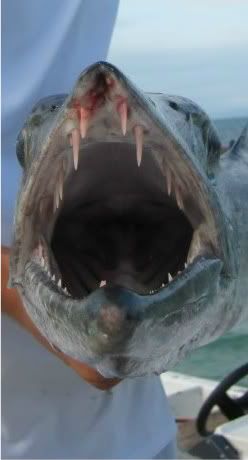Small Cuda are actually pretty easy to deal with. Very rarely are they deep hooked. As said previously, don't lay them down. If you are right-handed hold them vertically by the leader with your left hand, wet your right hand and grab them from the back just behind the gill covers.
Then gently slide your thumb and fingers under the innermost gill down to near the rear junction of their jaw bones, and grip them firmly. There are no teeth back that far in case your fingers and thumb go too far and wind up touching. They will immediately calm down, quit thrashing, and not gnash their teeth.
Cudas are muscular and their skins are very slimy, so this grip is the best to use on them since it best immobilizes their heads and jaws and does not remove their protective slime the way towels do.
I learned this technique well before reaching the age of double digits. In those days my dad and I and one of his buddies used to troll strips of mullet on three tandem 6/0 hooks. The danger of being attached by a loose 6/0 hook to a thrashing, snapping Cuda head was greater than that of their teeth alone. That technique eliminated that risk as well.
Being Catholic, we ate fish every Friday at a minimum, and those were my dad's preferred fish since they were good eating and so easy to catch year round.




